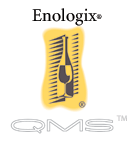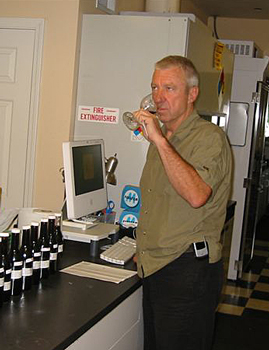

Leo McCloskey is equivocal: He bows to the importance of terroir but tells wineries how to get high scoring wines that may leave terroir behind.
California (State Appellation)
Leo McCloskey: “You Shouldn’t Have to Pay for Terroir”
“Terroir should be like religion, it should be almost for free. It should come with the wine like good punctuation. In that sense, I think terroir is valuable. It’s like having good grammar and speaking good English. Terroir is an attribute, it’s not a number.”
by
Alan Goldfarb
August 6, 2007
“No, they’re more distinct,” he says of the wines about which he consults. “… Who said I was making them homogenous? Who said they are homogenous? It’s a slam. It’s not the truth. The truth is products are more distinct and not overlapping when they’re bigger. …”
 And so it went. During a recent two-hour conversation at his nondescript offices west of the Sonoma square, McCloskey proved to be adroit at deflecting the onus away from himself. In fact, he’s downright affable and as clever as one might expect, declaring that what he’s actually up to is contributing to producing quality wine. Additionally, he’s not the one to be vilified if so many wines today cannot be singled out in a Law & Order lineup.
And so it went. During a recent two-hour conversation at his nondescript offices west of the Sonoma square, McCloskey proved to be adroit at deflecting the onus away from himself. In fact, he’s downright affable and as clever as one might expect, declaring that what he’s actually up to is contributing to producing quality wine. Additionally, he’s not the one to be vilified if so many wines today cannot be singled out in a Law & Order lineup.
He puts the blame squarely at the feet of those corporate wineries which seem to be encroaching on the wine industry more virulently than a Glassy Winged Sharpshooter, churning out gobs of wine that are indistinguishable from each other.
What then is Leo McCloskey up to when he pores through hundreds of thousands of computer readouts trying to determine how his 50 or 60 clients can shepherd their wines in a way that would cozy up to the arbiters of wine scores? And aren’t those same said wines – albeit at the very highest end of the market and as far away from mass produced wines as one can get – also without distinction, without place and bereft of a soul?
When I accuse him of helping to make wines that have no appellation or terroir characteristics, this is the way he responds:
“That’s very typical of wine media, which tends to come at anything new as, ‘Have you stopped beating your wife yet?’ In this case, ‘Have you stopped beating appellations yet? Now, if I said to you, ‘Yes, I’ve stopped beating appellations up,’ or no, ‘I haven’t stopped,’ I’d be legitimizing your question and it would be as if I said, ‘Yes, I’m against appellations.’ In fact, I have never, ever thought or worked in any way against appellations. I’ve never voiced an opinion about appellations other than to be employed by appellations themselves to do research on appellations. So, I would say I’m absolutely for appellations.”
Terroir Should be Like Religion
I read a quote attributable to him, “The consumer doesn’t need to know about terroir.” Then I point out that on Enologix’ Web site, its stated credo is, “Distinct regional wines are our first goal,” and tell him I find those statements dichotomous.He responds: “I was asked (in the context of the quote regarding terroir), ‘Does the consumer need to know about terroir with respect to scores?’ He (the writer) was begging me to say something controversial and he said, ‘Will you say ratings or terroir is more important?’
“I said I believe the quality metric (which he has tracked) for a wine is more sought after by the consumer than terroir is … Terroir is something that is found in relationship to intensity.

100 POINTS?: Leo McCloskey is constantly looking for the components that comprise high scoring wines and that includes checking samples in his lab.
“I love terroir,” he insists, “but it’s about the fourth most important thing in the purchase. Terroir isn’t as important to the consumer as the price you’re charging for your product. The most important thing is the price, quality, the style, the aging potential, and then we come to terroir.
“… I think you make these products more easily identifiable (re: terroir) by making them bigger. When you make wines more concentrated, yes, you can ask a higher price. (But) it’ll (terroir) be easier to detect and be very successful. … I think intense wines are linked to bottle price and (that) is linked to impressing. These are almost celebration wines.
“Most of us drink mid-bodied wines not meant to impress our neighbors,” he acknowledges. "But in these areas, terroir becomes more important. And terroir you shouldn’t have to pay for. What I’m objecting to about terroir is when people try to charge for it.
“Terroir should be like religion, it should be almost for free. It should come with the wine like good punctuation. In that sense, I think terroir is valuable. It’s like having good grammar and speaking good English. Terroir is an attribute, it’s not a number.”
Will terroir ever become more important than it is?
“Terroir ultimately will become a brand for high quality, medium and low quality in the important regions,” he predicts. “It’s the complete package.”How will this come about?
“They would legislate – let’s call it Napa Agra-Eco System (NAES),” he suggests. “It would have to be Bordeaux varieties. It would have to be red. It would have to be genetically controlled. Within that control it would become known that the best wines in Napa Valley came from certain regions. We would soon see Napa Valley divide Bordeaux varietal plantings where you would see Merlot north of Highway 121 down to Cuttings Wharf. You might see Rutherford be the pure Cabernet region. You might see Oakville get replanted between Cabernet and possibly Cab Franc or Petit Verdot. You might see Calistoga go more Petit Verdot and Malbec and less Merlot and no Cab Franc.
“The AVAs within Napa would become more and more specialized.”
When I point out that we’re beginning to see that happen organically, and then ask if varietal plantings actually need to be by government decree, he concedes: “Do we need to legislate? Probably not. … We would see a J.D. Powers of wine emerge that is producer-based, and uses insider knowledge to rate the brands. And it becomes a culture of openness and trusted-ness.”
Of course, he’s not above having Enologix become the J.D. Powers of wine ratings. “I would propose that there is a need right now to add some value to the Napa brand. And the way you can do that is hire a company like Enologix to rate the value. That’s not going to hurt Napa, that’s going to strengthen it. That’s going to create a lot of buzz, a lot of controversy. That’s going to create energy.
“If Napa was rated using producer-based knowledge as possessed by Enologix, we’re not going to do a bad job. We’re going to do a great job. I have all the same knowledge as the winemakers have in Napa. I must know as much as they know. I know which varietals are best, a sense of place, a sense of Napa.
How would that work?
“It would be better to have a producer-based source because of the unreliability of the critics,” he says, surprisingly. “Critics’ ratings, of cour










 READER FEEDBACK: To post your comments on this story,
READER FEEDBACK: To post your comments on this story,





